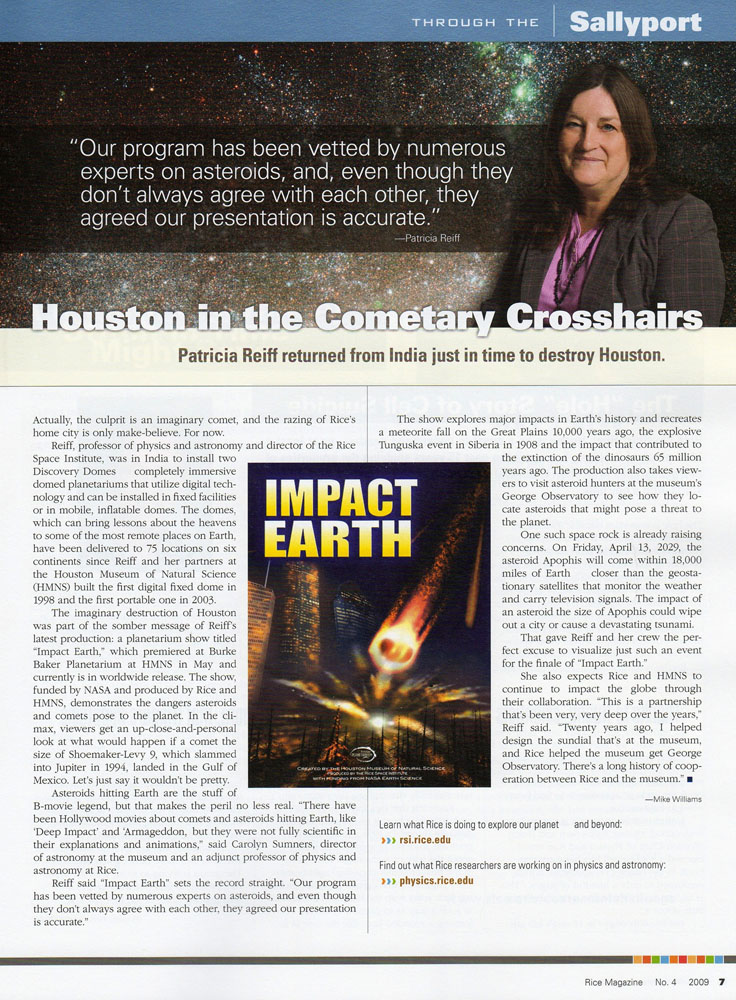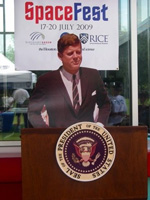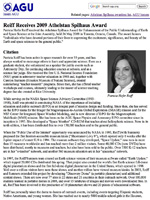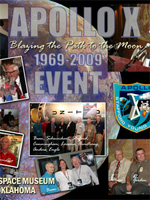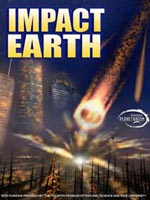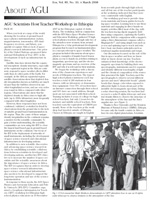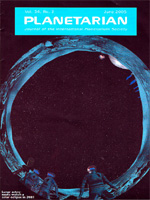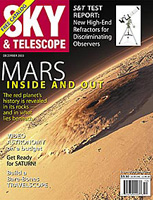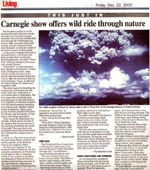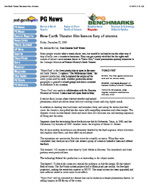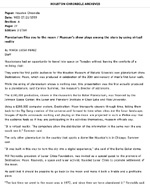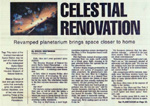Space Update Inc has been creating software and immersive experiences for the public since 1995. News of exhibits and shows has in the past primarily been limited to the local Houston, TX area. As the project has grown in scope and size with a more world-wide reach, press has also expanded. Below you will find links to some of the recent press releases and news coverage about our projects.
Patricia Reiff returned from India just in time to destroy Houston. Actually, the culprit is an imaginary comet, and the razing of Rice's home city is only make-believe. For now.
Reiff, professor of physics and astronomy and director of the Rice Space Institute, was in India to install two Discovery Domes - completely immersive domed planetariums that utilize digital technology and can be installed in fixed facilities or in mobile, inflatable domes. The domes, which can bring lessons about the heavens to some of the more remote places on Earth have been dlievered to 75 locations on six continents since Reiff and her partners at the Houstom Museum of Natural Science (HMNS) built the first digital fixed dome in 1998 and the first portable one in 2003.
July 17-20 drew many happy people to the Discovery Green in downtown Houston to celebrate the 40th anniversary of the Lunar Landing. Thanks to Greg Marshall and his volunteers! Visitors enjoyed space activities and space-related shows in the Discovery Dome and on the big screen. A fullsized cutout photo of JFK giving his famous "to the moon" speech on the Rice campus Sept 12, 1962, behind the actual podium (left) was a big hit. Two "Discovery Domes" (right) were on hand to wow the crowd. One showed "Future Moon" from HMNS (narrated by Walter Cronkite) and one showed "Dawn of the Space Age" by Mirage 3D, both in fulldome (filling the interior of the inflatable dome). Discovery Dome (www.discoverydome.com) is an outreach of the Rice Space Institute in partnership with HMNS.
Project Director Patricia Reiff was recently awarded the "Athelstan Spilhaus" award by the American Geophysical Union in recognition of her efforts in public awareness of science. To view the citation by the first award winner Robert Eather, and her response, go to http://www.agu.org/inside/awards/bios/reiff_patricia.html.
Weatherford, Oklahoma is the home of the Stafford Air and Space museum. On May 19, 2009 it hosted eleven Apollo astronauts and VIPs to celebrate the 40th anniversary of the Apollo X mission. RSI Director Patricia Reiff was onhand to present gifts to Gen. Stafford, here shown in front of the his Discovery Dome. Here she is presenting a copy of the JFK "to the Moon" speech, given in the Rice stadium September 12, 1962. She also presented to the Museum three full-dome planetarium shows to be shown in his Discovery Dome: "Earth's Wild Ride" (produced by Rice University); "Future Moon", (produced by HMNS), and "The Nature of Science", produced by Ott Planetarium. The Stafford museum is one of more than 90 Discovery Domes worldwide, an outreach of the Rice Space Institute (http://www.discoverydome.com).
A partnership of the Rice Space Institute with the Houston Museum of Natural Science brings a new planetarium show about major impacts to the fulldome screen. Members of the Rice Space Institute and community members of the RSI-Associates are invited to special screenings. See the RSI home page (rsi.rice.edu) to sign up! The show opens at HMNS on May 1 and will be available worldwide both for big domes and portable Discovery Domes.
When you look at a map of the world showing the location of ground-based space physics instrumentation (radars, magnetometers, ionosondes, GPS dual-frequency receivers, and lidars), you quickly recognize Africa's lack of space physics research infrastructure. One priority of the United Nations' sponsored International Heliophysical Year (IHY) is the development of such an infrastructure in Africa.
Researchers from the Rice Space Institute in partnership with the Houston Museum of Natural Science, are leadeing a NASA-funded project to develop portable technology that will allow exciting new "fully immersive" planetarium programs to be shown across the country inside inflatable, classroom-sized domes. Immersive Earth is a five-year $3.1 million project that brings together six museums, two universities, and three companies to create and distribute full-dome digital planetarium shows nationwide. Immersive Earth aims for a wider audience through the development of a small, fully portably system that uses an inflatable dome and single-projector display. The Immersive Earth grant will also pay for the creation of three new programs: Earth's Wild Ride, which takes place in the year 2081, is now available; Earth in the Balance; and Earth in Peril.
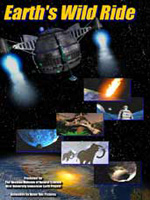
NOW SHOWING: "Earth's Wild Ride" at the Houston Museum of Natural Science. How would you describe the glories of Earth to colonists born on the Moon who can see the blue globe but can't go there? Take a virtual journey through the dramatic places of earth in fulldome digital theater. Soon will join our other fulldome digital shows available in our portable planetariums. Our new "Discovery Dome", with our "V-dome" vestibule entry, brings immersive theater "on the road" to schools and other venues at a very low cost.
When the Catawba Valley Astronomy Club, my local club in North Carolina, celebrates Astronomy Day every spring, we try to have at least one computer on hand running a sky-simulation program. While effective, such software usually doesn't do much other than demonstrate the night sky. Space Update not only models the sky but also brings together pictures, movies, and data about actual phenomena that take place on Earth, on other planets, elsewhere in the galaxy and beyond...
...Space Update is not an observer's program. It will most likely be favored as a hands-on attraction in a museum, observatory, or Astronomy day display, letting visitors get information about various space-related topics. It's a must-have for science teachers!... read more
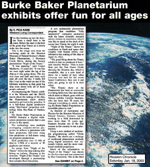
The opening of FORCE 5 in the Carnegie Museum of Natural History was featured in an article in the Pittsburgh Tribune-Review.
The opening of FORCE 5 in the Carnegie Museum of Natural History was featured in an article in the Pittsburgh Post-Gazette. Click the image to download a PDF version of that article.
Houstonians had an opportunity to travel into space on Tuesday without leaving the comforts of a reclining chair.
They were the first public audience for the Houston Museum of Natural Science's new planetarium show Destination: Moon, which was produced in celebration of the 30th anniversary of man's first lunar walk.
While the airing of planetarium shows is nothing new, this presentation was the first actually produced by a planetarium, said Carolyn Summer, the museum's director of astronomy.
The $100,000 production, shown in the museum's Burke Baker Planetarium, was financed by the Johnson Space Center, the Lunar and Planetary Institute in Clear Lake and Rice University.
...continued...
